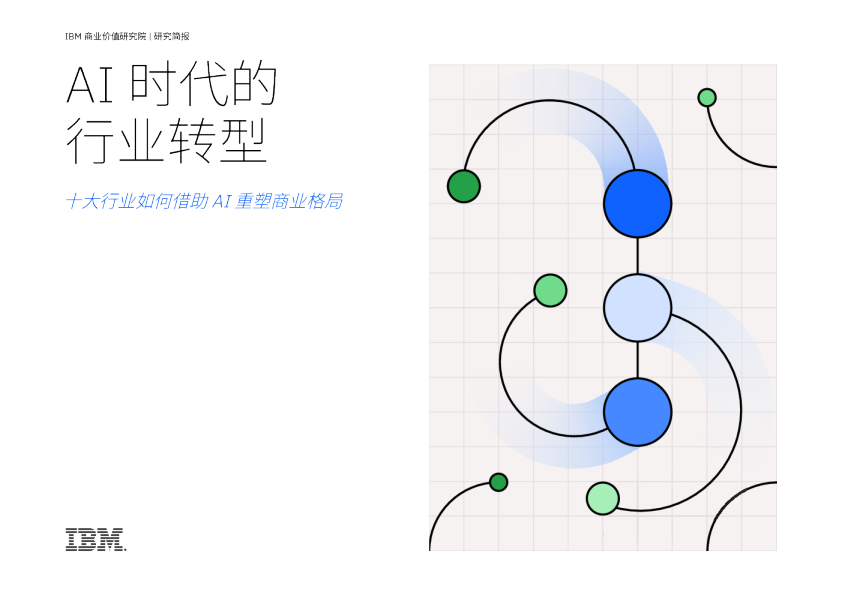2024年AI时代重塑药物研发:智能化技术如何变革生物制药行业研究报告
 AI智能总结
AI智能总结
智能技术如何改变生物制药行业 目录 关于研究第5页 第12页重新塑造研发组织 第6页研发机遇 第30页结论 第3页前言 前言 研发领域的领导者们对即将到来的挑战看法一致,表达了如下关切: 现在在进行人体首次临床试验之前,我必须考虑众多因素(如药物可及性、定价、报销和制造规模挑战)以及与治疗方式选择相关的因素。 我现在必须承担更大的风险来在高价值资产上扩展新技术,因为收益潜力是显著的。 我现在必须在投资一种资产(临床试验或外部创新)和一种新兴技术之间做出选择。 我现在必须进行投资,这些投资将在短期内创造价值,以便我能够资助关键技术和能力投资,这些投资对于研发革新至关重要,并在长期内产生回报。 生命变革性的干预措施,以前被视为空想,现在对生物制药行业来说已触手可及,这得益于对人类生物学日益深入的理解以及技术方面的无与伦比的进步。另一方面,该行业的研究和开发(R&D)生产力在过去十年中基本保持不变,而生物制药竞争市场的复杂性却持续演变。尽管智能技术承诺将加速科学进步并解决存在十年的某些基本研发挑战,但它们需要资本投资和深思熟虑的方法。 从基础科学中创造疗法并充分利用技术进步,需要公司重新设计其研发组织。生物制药公司若拥抱技术、革新其劳动力并重新聚焦组织优先事项,将提高研发效率和患者结果,并最终在日益严峻的宏观环境中确保增长。 全球研发部主管,安盛辉科技生命科学事业部主管 总经理,全球研究与临床领导,安永生命科学 作者们想感谢以下人员对其贡献: 巴里·希维在其开发和制造新型治疗方法方面的专业知识。 阿卡什·特里维迪,对于其在优化临床试验方面的专业知识。 塞伦·卡拉卡-格里芬领导力思想总监 - 产品与生命科学,安盛研究 亚历克斯·布卢姆伯格药品研究负责人,艾森哲研究部 Joanna Lisiecka对AI介导药物发现公司分析所提供的支持。 Nicole Crane 和 Alexandra Brown 对研发执行调查发展提供的支持。 Aran Bahl 和 Biagio Paoletta 对他们收集埃森哲领域专家意见的支持。 帕拉吉奥,妮可总经理,安永策略生命科学部 关于研究 在2021年,安永的《亿到千万:提高研发生产率》报告突显了药物研发在盈利性挑战中成本的不断上升和周期的延长。当时,云计算和人工智能等技术在生物制药研发中的应用刚刚起步,而生成式人工智能和大型语言模型等智能技术还处于起步阶段。 我们的研究方法分为三个部分: 1. 我们对年收入排名前20的生物制药公司的75位研发主管进行了调查,以了解当前的市场格局和变化的趋势。 我们对行业领域的专家进行了深入访谈,并利用了我们内部的专业知识。 今天,这些进展与对生物学的更深入理解相结合,已经推动了生物制药研发的演变。我们的最新研究超越了“从数十亿到数百万”的范围,该研究仅关注时间、成功率和潜在成本节约。这项全面研究纳入了诸如延长商业化周期带来的收入增加等因素。 我们开发了定制分析,包括一个用以量化未来潜在收益提升的模型,以及一个用以更深入理解研发成功贡献因素的指数。 我们的研究发现,在相对周期时间和技术及监管成功率(PTRS)方面优于同行的公司,其企业价值普遍实现了更大的增长。然而,这些改进的成功率和周期时间已不足以产生未来的商业价值。为了实现这一提升,必须在比传统价值讨论更早的阶段,仔细考虑未来潜在资产的价值。 研发机遇 所有生物制药公司首席执行官都认为,在利用智能技术创造价值方面,研发是生物制药价值链中最重要的机遇。 人类生物学的史无前例的理解加上新技术的进步,使得生物制药行业能够创造出我们之前只能梦想的、改变生命的干预措施。个性化细胞疗法正在治疗先前难以治疗的癌症,并显示出管理毁灭性的自身免疫疾病的前景。1针对罕见病和具有高未满足需求的遗传疾病,通过反义寡核苷酸(ASOs)和基因治疗正在出现目标治疗。2此外,通过抗体药物偶联物(ADCs)和放射性配体疗法开发的精准药物已成为现实。 到本世纪末,风险可能会增加,这将加大生物制药行业加快新药上市的压力——更快、成本更低,且不降低质量。3,4,5这主要是由于市场力量,例如药房福利经理人和保险公司对报销、获取和定价的影响。其他因素包括美国政府政策,如美国的《通货膨胀降低法案》,以及主要收入来源专利权丧失。 技术如人工智能(AI)、生成式AI、机器学习和下一代计算正以前所未有的速度推动科学进步,同时也在促进更好的商业和患者结果。我们的研究显示,利用技术实现这些结果已成为2024年生物制药首席执行官们的主要优先事项。 然而,该行业的研发生产力在过去十年中基本保持不变,而生物制药竞争市场的复杂性却持续演变。收入超过半兆美元 现在是重新设计生物医药研发的时候了。 结合快速发展的技术,我们所描述的预期收入差距正在引发一场智能技术浪潮,并产生一种迫切感,需要重新构思生物制药研发。 如果智能技术被大规模应用,并且工作流程得到适当的创新,公司可以将一种新药推向市场的时间缩短四年,每成功一种药物额外赚取20亿美元。 在这个新的科学时代,来自全球生物银行和电子病历(EMR)等来源的大量高质量人类数据可以彻底改变药物开发过程,从目标选择到临床试验设计和患者招募。我们的分析显示,如果大规模使用智能化技术,并适当重新设计工作流程以降低失败成本和缩短发现和开发时间表,公司可以将新药推向市场的时间缩短四年,每成功一种药物额外赚取20亿美元。6 通常,将一种成功的药物推向市场所需的成本在26亿美元至67亿美元之间(包括资本成本和失败成本),具体取决于治疗领域、治疗方式和疾病复杂性。7我们预计通过智能技术将这一成本削减35-45%。8 然而,潜在价值更为显著。即使临床成功率提高1%,也能带来数亿额外收入。主要风险包括技术、人才、文化和监管复杂性。所押注的人工智能和数字技术仍在成熟中,不可避免地会有失败和挫折。为了减轻这些风险,通过追求短期、高置信度机会和长期、高风险/回报项目的正确组合来维持平衡的项目组合至关重要。 执行一次创新策略将需要在未来五年内将年研发预算的8-10%投入到数字化转型计划中。9对于一个50亿美元的研发预算,这相当于每年4亿美元到5亿美元。这是一笔巨大的投资。 图1 研发组织在定义成功时必须考虑三个重要的价值杠杆。 一个成功的新定义: 在这个研发新时代,科学和智能技术正迅速融合,重新评估价值创造和研发成功定义的方式变得至关重要。查看图1) 度量1:技术和监管成功的概率(PTRS):不出所料,我们最近的调查显示,研发组织主要集中在PTRS度量。这是有道理的,因为PTRS的轻微提高会导致失败成本的大幅下降以及研发生产力的提升。 测量2:周期时间:在独家性丧失、持续下降的净价格以及政府对药品定价施加的压力下,补充收入缺口至关重要。这种加速是必要的,以保持与竞争市场的同步,并确保持续的收入增长。根据我们的调查,尽管首席执行官关注加速研发,但这一措施目前被低估。 措施3:未来潜力:公司必须尽早仔细考虑候选药物的商业和制造方面,以选择具有最高未来潜力的药物候选者。这一点现在比以往任何时候都更加关键,因为1)新型药物模式的增加及其相关的制造挑战,2)追求不同模式的经济学影响以及美国通货膨胀减少法案的影响,以及3)日益复杂的可及性和报销环境,这要求尽早就产品的临床和经济效益达成一致。 测量3:未来潜力是企业价值最大的驱动因素之一。需要在流程早期评估商业和制造成功的概率。 措施2:尽管CEO的关注度较高,但当前此措施仍未得到充分认可。只有20%的人将其列为成功的三个首要措施之一。 图2 研发成功指数 我们的研发成功指数是对过去10年进行的回顾性分析,展示了这一新模型的部分内容,考虑了周期时间对企业文化的影响(图2).10值得注意的是,在相对周期时间和PTRS方面优于同行的公司,通常在过去五年中企业价值增长更大。 智能技术为所有公司提供了一次提升项目管理效率和周期时间的机会。此外,公司现在必须发展他们对IND前管线资产未来潜在价值的理解。 要在未来取得成功,研发组织应采取全面的方法,优先考虑四个领域的革新,并以此为基础构建三个基石。此策略可以提高研发生产力,并加快创新疗法以成本效益的方式进入市场的速度。 本报告的其余部分首先关注这四个关键能力,其次关注支撑这些能力的根本性构建模块,为生物制药公司在快速发展的环境中蓬勃发展制定路线图。 重新塑造研发组织 为了解决CEO、研发部门和CTO面临挑战,重塑研发组织需要优先考虑两大主要任务: 2/应对推动变革的必要事项三个支撑和指导创新战略的基础性构建模块。2.1一个安全、AI就绪的数字核心2.2人才与领导力2.3一种持续革新文化 1/识别再创造机会 四大关键能力,应重点关注并投入资本,以推动重点资产在竞争中实现优势。 1.1利用人工智能进行发现1.2开发和制造新型治疗方案1.3优化临床试验1.4动态投资组合管理 1. 识别再造机会 四个关键能力,需要给予高度重视和资本投资,以推动优先资产在竞争中取得优势。 将新知识和技术转化为竞争优势和未来成功需要新的思维和新的流程。我们的经验表明,表现优异的公司之所以脱颖而出,是因为它们在四个革新机会上投入了大量资金。根据我们的调查,前三个机会已被视为研发成功的关键;利用人工智能进行发现、开发新型治疗方案以及优化临床试验。然而,通过更多关注第四个领域——动态投资组合管理,成功将得到进一步增强。 人工智能使新的工作方式成为可能,其中多学科团队的计算和科学专家进行合作,利用由AI和机器学习管理及优化的多样化数据集。这使识别出在临床中更可能成功的靶点变为可能,并为先导识别和优化提供预测建模服务。 公司必须建立跨职能团队,并为他们配备多样化、管理良好的数据集,以实现高效的靶点识别和验证、先导优化和分子设计。通过模拟实验在计算机模拟中, 科学家可以发现基因与疾病之间新的联系。 1.1 利用人工智能进行发现 •64% 将新药发现方法列为推动未来成功的前三大最重要能力之一。 •61%的人表示,这是他们的主要投资领域。 •72%的公司将它们的实力评为成熟,但我们的研究发现,尽管大多数公司正在尝试使用这些技术,但他们依赖伙伴关系来实现技术的规模扩张。 此外,将人工智能平台集成到科学运营模式中,将允许公司创建一个由人工智能引领的发现增强的全面规模化的研发组合。对于所有部署人工智能和生成式人工智能的举措而言,致力于应用负责任的人工智能原则,以管理数据集偏差和其他非预期后果的风险至关重要。 采用以AI为主导的发现策略,公司可以将发现周期缩短三分之二,并设计出以前不可能实现的疗法。AI驱动的洞察力还有助于生成稳健、全面的临床前数据集以支持试验,提高成功的几率。 领导者必须促进跨职能的数据治理、管理、连接以及“FAIRification”策略,该策略指的是可查找、可访问、可互操作和可重复使用的数据和研究成果。他们还必须努力构建一个强大的合作伙伴生态系统,以支持细分市场、高度差异化的能力,以及为新数据集的战略采购以产生洞察。 AI赋能的强大数字核心,使他们能够最大限度地利用他们拥有的数据,或者从临床试验和实验笔记中捕捉新数据。 存在一种互利共生关系,敏捷的AI介导药物发现公司与大型生物制药组织之间相互依存。这些公司在开发模型和架构、吸引顶级AI人才方面表现出色,而生物制药公司则拥有广泛的疗法领域专长、产品管线和大量数据,这些数据对于创建最有效的模型至关重要。二者之间的合作既合理又具有机会性,为推进创新和提升成果提供了巨大的潜在价值。 所有这些伴随着一系列挑战。例如,尽管AI辅助的药物发现越来越重要,但该行业还没有足够具备正确技能的人来推动进步。12尽管高质量数据对于开发这些模型至关重要,但许多公司并没有一个 小分子药物在临床试验中占比三分之二,共有73个资产,其次是单克隆抗体和肽类,各有19个资产。在这类小分子中,有30个专注于肿瘤学,9个针对




